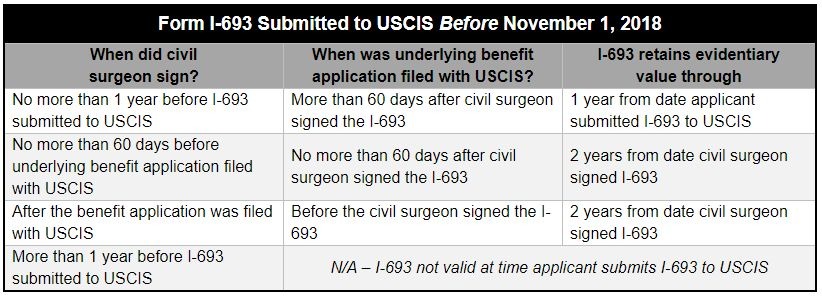Updated Form I-693 (Report of Medical Examination) Validity Policies

- Introduction
- Overview of Form I-693
- Validity of Form I-693
- Prior Form I-693 Validity Policies
- New Form I-693 Validity Policies (Effective Nov. 1, 2018)
- Effect of New Form I-693 Validity Policies for Forms I-693 Filed Before November 1, 2018
- Relevant Tables in the USCIS PM
- General Notes
- Reasons for Policy Change
- Conclusion
Introduction
On October 16, 2018, the United States Citizenship and Immigration Services (USCIS) revised its policy guidance regarding the validity period of the Form I-693, Report of Medical Examination and Vaccination Record. The revised guidance is found in Policy Alert (PA)-2018-09, titled “Validity of Report of Medical Examination and Vaccination Record (Form I-693)” [PDF version]. The PA primarily modifies 8 USCS PM B.4 [PDF version]. Please note that all references to the USCIS PM in this article are current as of the date of publication, October 16, 2018.
Under the new Form I-693 validity policy, an applicant will be required to submit the Form I-693 to the USCIS within 60 days of its completion by a civil surgeon. However, provided that the Form I-693 is properly completed and submitted within the 60-day window, it will remain valid for two years from the date of completion instead of one year. Different rules may apply in some cases for Forms I-693 submitted prior to November 1, 2018. We will examine the new Form I-693 policy and cases still governed by the former policy in this article.
Overview of Form I-693
The Form I-693 is used to determine whether an application for an immigration benefit is inadmissible to the United States on health-related grounds under section 212(a)(1) of the Immigration and Nationality Act (INA). The Form I-693 is filled out by a USCIS-designated civil surgeon. We discuss the medical examination requirement for adjustment of status in a separate article [see article].
Validity of Form I-693
The Form I-693 must satisfy several criteria in order to constitute valid proof that the applicant is not inadmissible on health-related grounds under section 212(a)(1) of the INA [see section]. The new policy changes two time-related requirements for the Form I-693.
Prior Form I-693 Validity Policies
Under prior policy, the Form I-693 had to be submitted to the USCIS within one year of the date of the underlying medical examination. Furthermore, the associated benefit application had to be fully adjudicated by the USCIS within one year of the date that the Form I-693 was completed by the civil surgeon. The latter requirement often resulted in applicants having to obtain a second Form I-693 due to long processing times.
New Form I-693 Validity Polices (Effective Nov. 1, 2018)
Under the new policy, which affects Forms I-693 filed after November 1, 2018, applicants will be required to submit the Form I-693 to the USCIS within 60 days of the date that the civil surgeon signed it. However, such a properly submitted Form I-693 will remain valid for two years instead of the previous one year. This means that once the Form I-693 has been properly filed, it will remain valid for two years from the date of the civil surgeon's signature while the USCIS adjudicates the application. If the application is still pending after those two years, however, the applicant would need to obtain a new Form I-693.
Effect of New Form I-693 Validity Policies for Forms I-693 Filed Before November 1, 2018
The USCIS contemplated that there will be a significant number of Forms I-693 attached to pending applications when the calendar turns to November 1, 2018. In cases where the Form I-693 was submitted in accordance with the post-November 1, 2018 rules, the Form I-693 will be valid for two years, notwithstanding the fact that it was filed before the effective date of the new policy. However, any Form I-693 submitted prior to November 1 that complies with the rules of the former policy, but not with the rules of the new policy, will remain valid for one year from the date of the civil surgeon's signature.
Relevant Tables in the USCIS PM
8 USCIS-PM B.4 provides two useful tables illustrating the validity status of Forms I-693 filed before and after November 1, 2018, under the new policies. We have reproduced the tables below for your convenience:


General Notes
Notwithstanding the general policies for Form I-693 validity, the PM notes that “even if all of the … criteria are met, but the [USCIS] officer has reason to believe that the applicant's medical condition has changed since submission of the Form I-693 such that the applicant's admissibility could be affected, the officer, in his or her discretion, may request that the applicant submit a new Form I-693.” In short, the USCIS may request that the applicant submit a new Form I-693 even if the previous Form I-693 comports with all of the requirements in this article. This request would be within the discretion of USCIS. This applies to all Forms I-693, whether under the new or former validity policies.
The applicant must submit an acceptable version of the Form I-693. The acceptable version of the Form I-693 at any given time is accessible from the USCIS website. When filing any USCIS form, an applicant should always consult the USCIS website to ensure that he or she is using an acceptable edition of the applicable form.
Where required, applicants may either submit the Form I-693 concurrently with the benefit application or at any time between the filing of the application and the USCIS's finalizing adjudication of the application. The USCIS PM states that “[i]f not submitted simultaneously with the immigration benefit application, applicants may bring the medical examination report to an interview or wait until USCIS issues a[] [request for evidence] requesting the [Form I-693].” Applicants who retain immigration counsel should consult with their attorney for guidance on how to handle the Form I-693 requirement.
Reasons for Policy Change
The USCIS PA and PM explain the reason for the new Form I-693 validity policies. Each stated that the USCIS had observed an increasing number of Forms I-693 expiring due to long application processing times. That these applicants had to obtain new Forms I-693 both “further delay[ed] processing the underlying application and inconvenic[ed] the applicant.” The objective of the new policy is “to reduce the need for USCIS to request an updated Form I-693, thereby streamlining case processing and minimizing inconveniences to applicants.”
Conclusion
The new Form I-693 policy shortens the time period for one Form I-693 validity requirement while lengthening another. Under the new policies, applicants will have only 60 days from the date that the civil surgeon completes the Form I-693 to submit the Form to the USCIS. However, provided that the Form I-693 is properly completed and submitted within that 60-day window, it will remain valid for two years from the date of the surgeon's signature instead of one year. In theory, the new policy will reduce the need for applicants to obtain a second Form I-693 due to long processing times. However, the actual benefits of the policy in this area remain to be seen.
Applicants who are required to submit a Form I-693 should consult with an experienced immigration attorney for guidance on which set of validity policies apply and other aspects of the filing process. Please see our full articles to learn more about the medical examination requirement for adjustment of status specifically [see article] and the vaccination requirement for adjustment of status [see article].